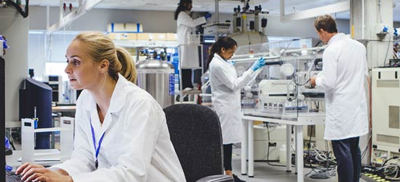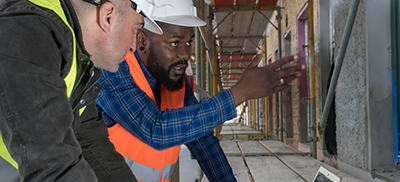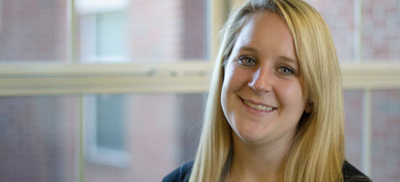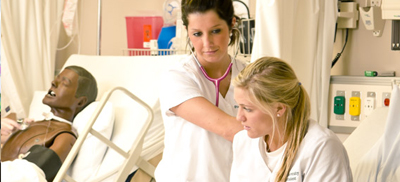To better serve her community and build more partnerships within it, Julia Chavez enrolled in Stevenson’s Community-Based Education & Leadership master’s program. Currently, she works as a Bilingual Early Intervention Service Coordinator with The Children and Family Support Services Program at Kennedy Krieger Institute. We had the opportunity to speak with Julia about her journey prior to Stevenson and her experiences within the program.
Before attending Stevenson, I earned my bachelor’s from UMBC in Linguistics and became certified in Spanish, French, and ESOL through graduate-level classes at the University of South Florida. Before moving to Florida, I lived in Arizona and volunteered at a literacy program for adults. Upon moving to Florida, I worked at Pre-GED, ESOL, and Job Development/Life Skills with the Migrant and Seasonal Farmworkers Program. When I moved back to my native Baltimore, I returned to the classroom and taught Spanish at Montebello Elementary. Then, I taught Spanish to middle schoolers at Garrison Forest School where I was also very involved in building the diversity curriculum.
While teaching, I still had a desire to go back to a more human services-focused role with Latinos in Baltimore which prompted me to work as an Adult Education Counselor with GED students at Baltimore County Community College during the summer term. I eventually moved to the Kennedy Krieger Institute’s Southeast Early Head Start as a Family Advocate, which evolved into my current position. In my role, I work in partnership with the Baltimore City Infants and Toddlers Program and Baltimore City Schools. I serve Latino families who have infants and toddlers who have, or are at risk of having developmental delays. We ensure that the children go through evaluations, and that services are provided if needed. Additionally, we provide interpretation, connect them with community resources, ensure continuity of services, and facilitate them through the IEP process if they qualify and choose to participate. Working with the families and seeing the love, hope, and commitment they have for their children is the most fulfilling part of my job. Watching them learn, implement strategies and activities, and seeing the positive outcomes when everything comes together is wonderful. They are empowered by the realization that they are their child’s first teacher and greatest love.
I heard about Stevenson’s Community-Based Education & Leadership master’s program and its multi-faceted, realistic, and practical approach to the coursework appealed to me. The program combined communication, diversity, and special education, which I thought was a good fit for my skills and experience and would help me reach my goals of working to improve the quality of life for Baltimore City residents. I also felt that the program focused on building not only community, but partnerships as well – these partnerships are crucial to building healthy communities. The intimacy of a small university appealed to me as well as Stevenson’s reputation for quality education. The fact that this program is designed for the working professional made it a good fit in terms of scheduling and work load. It was surprisingly affordable when I compared it to other online programs, though no one else offers a community-based education master’s program like this one. Though I was skeptical about receiving individualized attention in an online program, I have been very well-attended at Stevenson. My advisor and the director of the program know me by name and respond to any question or issue that may come up in a very timely manner. The online technology is very user-friendly and tech support is available at all times. The instructors give valid individualized feedback. The lessons, assignments, and reading materials are relevant to my work with the community. I can use my work in my studies and use what I study at work.
My advice to anyone starting out in education is to remember that the learner drives your purpose and is the most important thing. Never generalize or assume; see each student as an individual learner. Have that difficult conversation you are dreading, the most difficult situations are often the best catalyst for essential communication and will often create the most meaningful bonds with students. A good teacher should realize that learning can happen at any time and in any place, we all learn from each other. Do not judge your students or their abilities, but constantly assess them to meet them where they are, figure out their needs and how they are processing the information in order to know how and at what rate to proceed and enable progression of knowledge.
Throughout my experiences, the most important thing I have learned is that life choices are all valid, varied and individualized and should not be judged. Flexibility and adaptability are key because life is nothing if not constant change. Every change is an opportunity for learning. The hardest situations are usually the ones we learn from the most. In my life, I have been blessed with very strong independent women. My mother inspires me with the many times she has reinvented herself. I also admire her passion for her beliefs and for helping the Latino community. My grandmother continues to inspire me through her wisdom and strength. She educated herself through reading since she was orphaned and never had the opportunity to go to school beyond the second grade – this is what drives me to work with adults and in community-based education. The families I work with everyday inspire me with the love and commitment they have to do everything possible for their children’s benefit in spite of any odds that they face. When I am not working, I enjoy yoga, painting and I am an avid reader. I love long road trips with my husband on his motorcycle. I also love films – fantasy, and period pieces especially. I love to cook Cuban food and I am very fond of animals, especially dogs of which I have two Boston Terriers. I enjoy wandering around the city and going to museums and out to eat.






